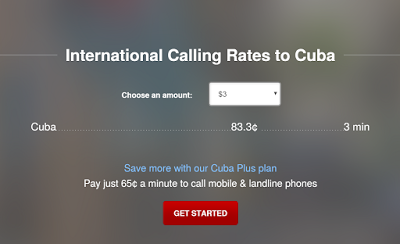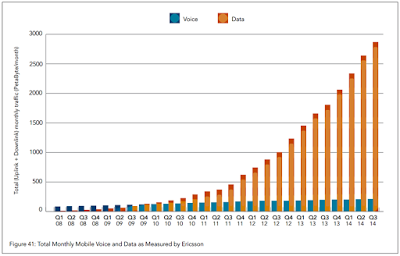Cuba USA
Verizon and Sprint both offer mobile roaming in Cuba, and Verizon has just signed a direct-connection agreement.
I am frankly not sure what the difference is between a "direct-connection" and their earlier "roaming" agreement, but it sounds like simpler routing, eliminating middle-man networks.
That should lead to better sound quality and lower prices. Verizon has not announced their prices, but we can get a clue by looking at today's roaming prices. Sprint charges $2.49 per minute for voice calls, $1.99 per megabyte of data and 50 cents to send SMS text messages. (Receiving SMS messages is free). Verizon’s current roaming rates are $2.99 per minute for voice calls and $2.05 per megabyte of data.
IDT, which established a direct connection with Cuba last year, claims "crystal clear conversations, low rates and no hidden fees." Their rates for calling Cuba from the US are shown below, but I cannot find their rates from Cuba and I don't understand the difference between the 65 cents a minute and 83 cents for three minutes services.

It is also rumored that AT&T will announce some sort of deal before President Obama's trip to Cuba, so we may soon have cheaper phone calls between the US and Cuba.
That is good, but, to paraphrase Bill Clinton -- "It's the Internet, stupid."
As shown below, mobile traffic is increasingly data, not phone calls. We called them "phones" till about 2011, but now they are "computers."
ETECSA said the service agreement will "initially allow the offering of voice services," which perhaps implies that they will eventually offer data services, but nearly all of Cuban mobile connectivity is 2G.
These deals demonstrate that Cuba is willing to let a state enterprise deal with US companies and they may be feet in the door leading to eventual domestic infrastructure agreements, but that remains to be seen. In the meantime, direct or indirect roaming may be mostly for tourists and Cubans will still crowd around ETECSA hotspots.
-----
Update 3/18/2016
If you are serious about the question of telephone regulation between the United States and Cuba, you need to follow the writing of Eduardo Guzman. For a detailed history up to last year, see his article Telecommunications in Cuba and the U.S. Embargo: History, Opportunities, and Challenges
There have been many regulatory changes since that time, leading up to the establishing of direct telephone connections by IDT, Sprint and Verizon. Guzman surveys the history then brings us up to the present in a long blog post "U.S.-Cuba Telecommunications: Turning the Corner."
Direct telecommunication service between the United States and Cuba essentially ended after the imposition of the embargo in the early 1960s. The Cuban Democracy act of 1992 allowed US carriers to provide telecommunications services between the U.S and Cuba, but there were so many strings attached -- including a $.60 per minute cap on settlement rates -- that nothing happened.
The deadlock was broken by the Obama Administration and Guzman imagines that we will see "increased use of cellphones to make direct calls to Cuba from the U.S., more options for traditional wireline long distance service to Cuba from the U.S., and new products sold to U.S. consumers to allow their relatives and friends in Cuba to make cheaper calls to the U.S." as well as services aimed at U. S. tourists roaming in Cuba.
That will enable families to talk with each other and tourists to call home, but it does nothing for broadband connectivity, which would require further negotiation and, more important, upgraded Cuban infrastructure. We've "turned a corner," but the road ahead is long and full of obstacles.
- The New York Times Cannot Ignore Cuba
by Omar Pérez Salomónsource Pupila Insomnetransaltion Cuba -Network in Defense of Humanity Everything seems to indicate that the time has come to move The New York Times piece in the chessboard planned and organized from Washington to attack and give...
- Sprint Connected Cuba In 1996, How About 2016?
Does Sprint have an advantage over other US companies? Journalist Mark Walsh (@markfwal) sent me an interesting conjecture -- perhaps Sprint is well positioned to play a role in Cuba's mobile connectivity. He pointed out that Sprint already offers...
- Etecsa Will Sell -- And Service -- Huawei Phones.
ETECSA has agreed to sell and service Huawei phones. Since Cuban cell service is 2G, they will be used for voice calls and Internet access at WiFi hotspots and elsewhere. (I have heard that there is a little 3G coverage in Cuba -- is that the case)? Javier...
- Cuba Is Using Wifi For Short Run Portable Connectivity
I've been in Scandinavia and Vietnam this year and have not bothered to get a SIM card for my phone -- WiFi was available wherever I went. Let me start with a look at today's Cuban WiFi, then turn to the question of portable and mobile connectivity...
- Etecsa Officials Provide Some Details And Make Some Promises
Etecsa officials held a press conference in which they made the point that the 118 new Internet access rooms are just the start of improved Internet service. They promised lower prices, more access rooms, WiFi in access rooms, mobile connectivity, etc.,...
Cuba USA
Verizon's direct-connection agreement is nice, but it's not the Internet
Verizon and Sprint both offer mobile roaming in Cuba, and Verizon has just signed a direct-connection agreement.
I am frankly not sure what the difference is between a "direct-connection" and their earlier "roaming" agreement, but it sounds like simpler routing, eliminating middle-man networks.
That should lead to better sound quality and lower prices. Verizon has not announced their prices, but we can get a clue by looking at today's roaming prices. Sprint charges $2.49 per minute for voice calls, $1.99 per megabyte of data and 50 cents to send SMS text messages. (Receiving SMS messages is free). Verizon’s current roaming rates are $2.99 per minute for voice calls and $2.05 per megabyte of data.
IDT, which established a direct connection with Cuba last year, claims "crystal clear conversations, low rates and no hidden fees." Their rates for calling Cuba from the US are shown below, but I cannot find their rates from Cuba and I don't understand the difference between the 65 cents a minute and 83 cents for three minutes services.

It is also rumored that AT&T will announce some sort of deal before President Obama's trip to Cuba, so we may soon have cheaper phone calls between the US and Cuba.
That is good, but, to paraphrase Bill Clinton -- "It's the Internet, stupid."
As shown below, mobile traffic is increasingly data, not phone calls. We called them "phones" till about 2011, but now they are "computers."
 |
| Source: Akamai |
ETECSA said the service agreement will "initially allow the offering of voice services," which perhaps implies that they will eventually offer data services, but nearly all of Cuban mobile connectivity is 2G.
These deals demonstrate that Cuba is willing to let a state enterprise deal with US companies and they may be feet in the door leading to eventual domestic infrastructure agreements, but that remains to be seen. In the meantime, direct or indirect roaming may be mostly for tourists and Cubans will still crowd around ETECSA hotspots.
-----
Update 3/18/2016
If you are serious about the question of telephone regulation between the United States and Cuba, you need to follow the writing of Eduardo Guzman. For a detailed history up to last year, see his article Telecommunications in Cuba and the U.S. Embargo: History, Opportunities, and Challenges
There have been many regulatory changes since that time, leading up to the establishing of direct telephone connections by IDT, Sprint and Verizon. Guzman surveys the history then brings us up to the present in a long blog post "U.S.-Cuba Telecommunications: Turning the Corner."
Direct telecommunication service between the United States and Cuba essentially ended after the imposition of the embargo in the early 1960s. The Cuban Democracy act of 1992 allowed US carriers to provide telecommunications services between the U.S and Cuba, but there were so many strings attached -- including a $.60 per minute cap on settlement rates -- that nothing happened.
The deadlock was broken by the Obama Administration and Guzman imagines that we will see "increased use of cellphones to make direct calls to Cuba from the U.S., more options for traditional wireline long distance service to Cuba from the U.S., and new products sold to U.S. consumers to allow their relatives and friends in Cuba to make cheaper calls to the U.S." as well as services aimed at U. S. tourists roaming in Cuba.
That will enable families to talk with each other and tourists to call home, but it does nothing for broadband connectivity, which would require further negotiation and, more important, upgraded Cuban infrastructure. We've "turned a corner," but the road ahead is long and full of obstacles.
- The New York Times Cannot Ignore Cuba
by Omar Pérez Salomónsource Pupila Insomnetransaltion Cuba -Network in Defense of Humanity Everything seems to indicate that the time has come to move The New York Times piece in the chessboard planned and organized from Washington to attack and give...
- Sprint Connected Cuba In 1996, How About 2016?
Does Sprint have an advantage over other US companies? Journalist Mark Walsh (@markfwal) sent me an interesting conjecture -- perhaps Sprint is well positioned to play a role in Cuba's mobile connectivity. He pointed out that Sprint already offers...
- Etecsa Will Sell -- And Service -- Huawei Phones.
ETECSA has agreed to sell and service Huawei phones. Since Cuban cell service is 2G, they will be used for voice calls and Internet access at WiFi hotspots and elsewhere. (I have heard that there is a little 3G coverage in Cuba -- is that the case)? Javier...
- Cuba Is Using Wifi For Short Run Portable Connectivity
I've been in Scandinavia and Vietnam this year and have not bothered to get a SIM card for my phone -- WiFi was available wherever I went. Let me start with a look at today's Cuban WiFi, then turn to the question of portable and mobile connectivity...
- Etecsa Officials Provide Some Details And Make Some Promises
Etecsa officials held a press conference in which they made the point that the 118 new Internet access rooms are just the start of improved Internet service. They promised lower prices, more access rooms, WiFi in access rooms, mobile connectivity, etc.,...
